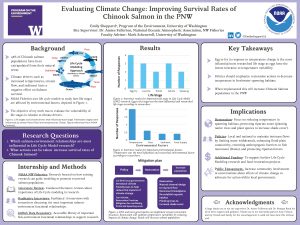EVALUATING CLIMATE CHANGE: INCREASING SURVIVAL RATES OF CHINOOK SALMON THROUGH FUNCTIONAL ENVIRONMENTAL RELATIONSHIPS
Climate change is threatening Chinook salmon populations in the PNW through rising river and stream temperatures. Currently 40% of salmon populations have gone extinct from their natural areas. This is damaging river ecosystems with a lack of nutrients leading to a loss of ecological diversity. The aim of this study was to find ways to increase salmon survival rates by evaluating salmon functional-environmental relationships of different life stages of Chinook Salmon. This in turn can be used to aid research for the development of life cycle models (LMC) used to evaluate how salmon populations are affected by climate change. In the past there has been a lot of research done on the relationships between life stages of salmon, however, there are gaps in this research that lack quantitative data of the viability of any individual life stage in response to future climate change. Closing these gaps will maximize recovery efforts and prevent further environmental impacts on aquatic ecosystems. During my internship with the National Oceanic Atmospheric Administration (NOAA) NW Fisheries I worked with a team of researchers to conduct qualitative interviews of fishery scientists to determine the most influential salmon-functional environmental relationships. I then took this information and worked on finding climate solutions to increase survival among Chinook salmon at the most influential life stage in relation to environmental drivers that were affecting survival. The implications of this study will further increase survival and reduce future effects of climate change in river ecosystems in preparation for a warming climate.
